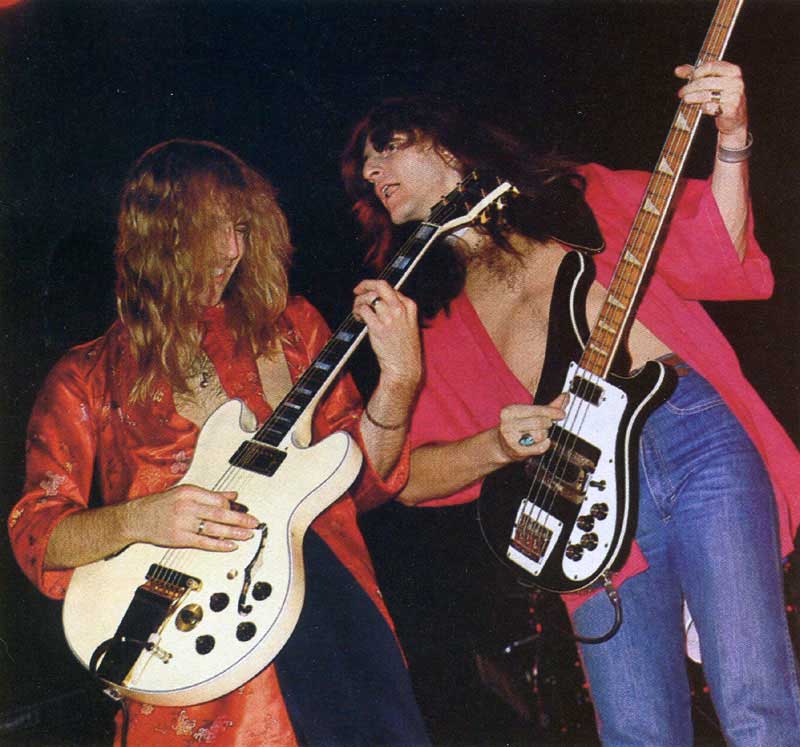Rush Concludes Cygnus Cycle
There Is Only One Actual Song On Rush's 'Hemispheres' - Looks Like A Danger Signal
By Bart Testa, Circus' "Longplayers" section, December 12, 1978, transcribed by pwrwindows

Rush is a post-heavy metal band. Though musically only a mild revision of the basic metal moves, post-him shoots off into alternative universes, into sci-fi, fantasy, magic, and the albums are almost always conceptual. The style's prototype and perpetual master, Led Zeppelin, took up British neopaganism and magic, guided by magician Aleister Crowley. Rush similarly moved into sci-fi and fantasy (as far back as Caress of Steel) and took thematic cues from Ayn Rand.
Since Ayn Rand is a cranky old woman philosopher whose main message is one of selfishness, she might seem an unlikely choice for a post-hm mentor. But actually Rand is the ideal author for Rush, the most popular band to come out of Canada since Bachman-Turner Overdrive, since most people in Rush's home town of Toronto read Rand before they get out of school. She's all Big Themes and Heroic Gestures, the key ingredients in the post-hm formula.
Rush takes to the spirit of Rand's themes like a fleet of starships launching out for distant galaxies. They play stupendous fanfare music, blast-offs into the Void. They also have learned, since 2112, how to catch the aural sound of the Void with their deep space instrumentals. Lead vocalist (and bassist) Geddy Lee sings with a Plant-like yelp, but he's more earnest. None of those dirty sex scenes for Lee. Just straightforward incantation, as befits someone giving voice to his own deification, "Cygnus, the Bringer of Balance."
These are the further adventures of Cygnus, carried over from last year's Farewell to Kings. That album presented Book I. The whole first side of Hemispheres is turned over to Book II. The world has lost the order of life because the gifts of Apollo and Dionysus (Rand's symbols for technology and ecstasy) have been split, creating an apocalyptic division of Mind and Heart. The hero-god Cygnus comes out of the resulting chaos to save earth by mounting Olympus and becoming the Bringer of Balance. The side concludes with a soliloquy, probably belonging to the now-divine Cygnus:
We can walk our road together
If our goals are all the same
(and)
With the Heart and Mind united
In a single perfect sphere
Rush idealizes some imaginary age of conformity. "If our goals are all the same" is a line that suggests we'd all be led by a hero instead of a mere politician. There's a rage for order in Rush's lyrics, very peculiar for a rock band. Of course, it is a commonplace in fantasy and sci-fi that what one believes is simple and clear and that heroes are never skeptical.
The sentiments Rush puts into their music are always positive. Who, after all, would like to see the conflict of Mind and Heart continue? It would be like hating Mom, apple pie or, for rockers, hating cars. Still, Cygnus has ominous overtones of superhuman dictatorship, as if humankind were not fit to live its life without apocalyptic warriors from Above.
Rush's performances in the Cygnus cycle are their most advanced. 2112 had too many dead spots to really work but now they managed to interlock metal whirlwinds, propelled by drummer Neil Peart, and solemn space rock pastorals. Guitarist Alex Lifeson works in two distinct styles, a post-Zep roar and a delicate artrock manner. His "La Villa Strangiato (an exercise in self-indulgence)," divided into 12 short "movements," is a piece of fantasy program music that carefully anthologizes his favorite moves. The piece, and more so its title, suggests that Rush may have internal problems. Even post-hm may be proving too constricted a form for Lifeson even though he has been taking more and more solo space on each of their albums since 2112. Similarly, Lee's vocals have increasingly been set in the form of "recitatives," with the band barely audible when Lee is singing. So far, they have been able to hold the sound together by composing in contrasting suites consisting of short pieces strung together into concept works. But, and this is a real danger signal, there is only one actual song on Hemispheres, "Circumstances." And it's not very good, either.